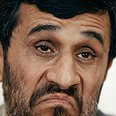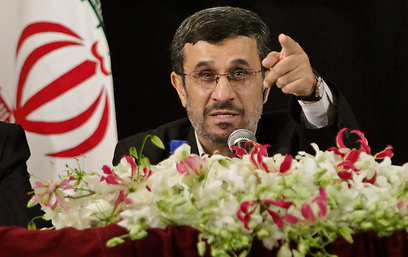
Extra sanctions aim to punish Iran, restrain Israel
US, EU set to impose tougher nuclear sanctions on Islamic Republic; measures said to be punitive for Tehran while seeking to restrain Israel
The European Union and United States are set to toughen nuclear sanctions aiming to punish Iran while seeking to hold back Israel from a military strike, top officials said as the showdown enters a critical phase.
Western moves to pressure Iran have been made more urgent by Prime Minister Benjamin Netanyahu's stern call for a "clear red line" against the Islamic state's nuclear drive, diplomats said.
Related stories:
- Obama, Netanyahu united against Iran nuclear drive
- Iran demands UN action over 'nuclear terrorism'
- Report: Iran, Russia operating joint command on Syria
But they highlighted lingering uncertainty about if and when Israel could launch unilateral action.
The European Union will be first to step up sanctions as part of the international campaign of pressure alongside increasingly frustrating efforts to negotiate a halt to Iran's uranium enrichment.
"What we will do next is intensify sanctions," a top Western official close to talks on the crisis said on the sidelines of the UN General Assembly. EU foreign ministers are to meet in Luxembourg on October 15 to discuss the measures.
"They will include the financial area, definitely," the official added, speaking on condition of anonymity. He stressed, however, that the measures have not yet been settled.
'Iran on verge of bankruptcy'
Iran's economy has been severely hit, particularly by action against its oil industry.
Its rial currency fell 6% to a new low of about 28,600 to the dollar on Saturday, according to exchange analysts. It has lost 60% of its value this year, while food prices have risen 50%.
The European Union ordered a ban on Iranian oil purchases from July 1, but Britain, France and Germany are "united" in pressing for additional sanctions by the 27-nation bloc, the official said.
A second senior official said the United States is also looking for "new areas" where sanctions could be applied or toughened.
The US Congress approved action in August targeting companies that work with Iran's petroleum or natural gas sector, provides insurance to the National Iranian Oil Company, engages with uranium mining with Iran or sells oil tankers to the country.

Iranian President Mahmoud Ahmadinejad (Photo: EPA)
"There are always ways to refine the measures already taken by the administration," the official said, also speaking on condition of anonymity.
"The number of targets could be increased. The aim has got to be to hit the government but not the people."
Netanyahu's speech to the UN General Assembly unnerved many. He warned that Iran could have the necessary material to make a bomb by mid-2013 and called for "red line" to stop Iran enriching uranium to the required purity for a bomb.
Netanyahu indicated that his deadline for a decision on action is now after the November 6 presidential election in the United States. But Israeli officials increasingly indicate their impatience with the sanctions path.
"Iran is on the verge of bankruptcy because of the sanctions, and there are growing protests against the ayatollahs, but these sanctions have not dissuaded the regime in power in Tehran from pursuing its nuclear ambitions," Israel's deputy Foreign Minister Danny Ayalon said last week.
The first senior official noted that Western nations "have said to Israel that we are not in favor, in these circumstances when we are pursuing sanctions and negotiations, of any attack on Iran."
The US administration "wants to pursue diplomacy, so we are nervous of any suggestion of any attack," said the second official.
The trio of European nations plus the United States, Russia and China – the so-called E3+3 group – has sought to negotiate with Iran, which denies it seeks a bomb.
Experts from the six are due to meet in London soon to "determine our negotiating position for any further meeting with the Iranians," the first senior official said.
EU foreign policy chief Catherine Ashton said she would be contacting Iran to determined whether more negotiations should be held.
Alongside the sanctions and talks, the United States and Europe have also stepped up pressure on Iran over its support for Syria's President Bashar Assad and militant groups in the region.
The United States is pushing Gulf states to develop missile defense plans, amid what they see as a rising threat from Iran, US officials said.
- Receive Ynetnews updates directly to your desktop










